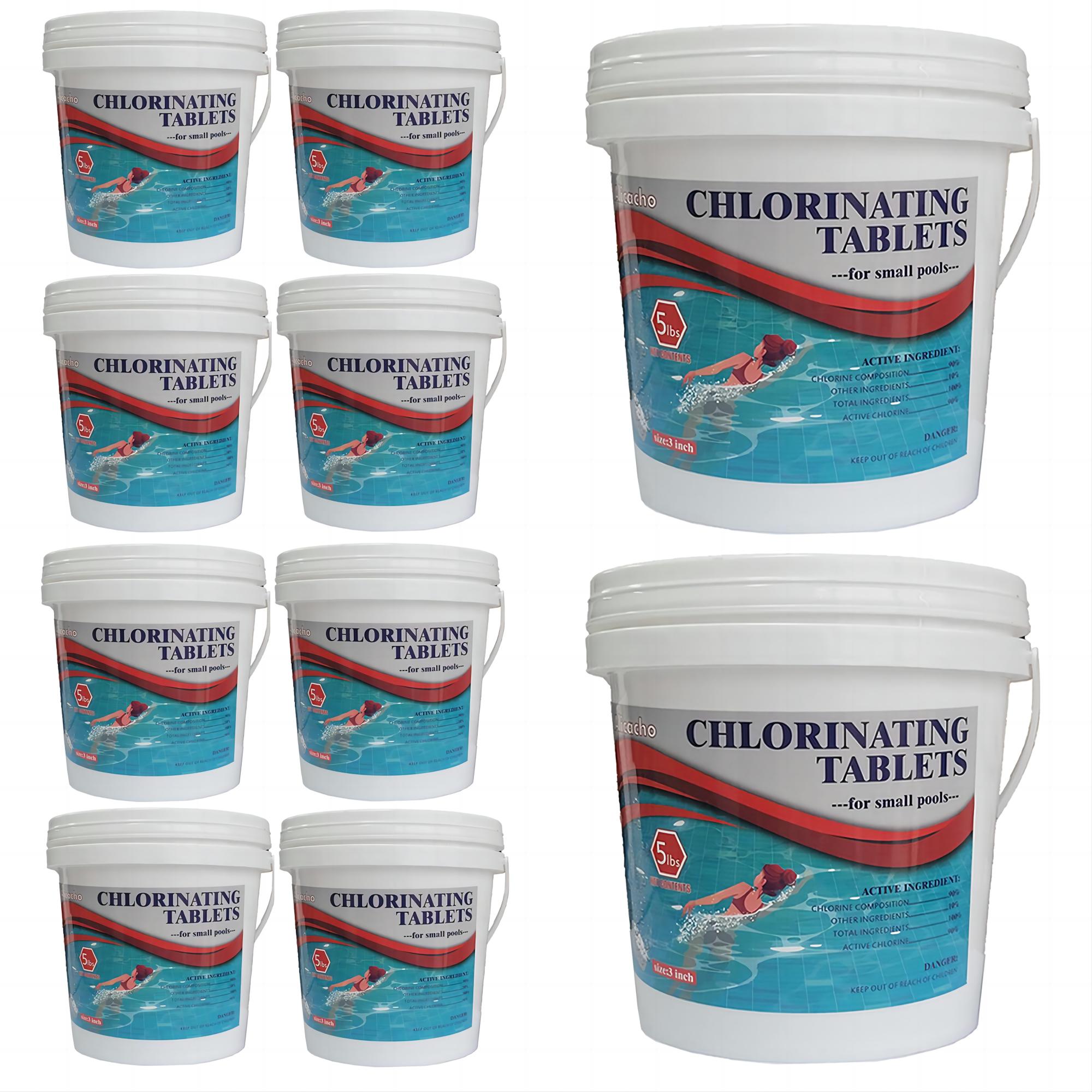No one would ever want to dip in a muddy and dirty pool, this is why chemicals were introduced in pools like chlorine. What does chlorine do in a pool, and how useful it could be once you start utilizing it as part of your pool maintenance activities?
Chemistry has lots of magic, it can even help pool owners maintain their pools by fighting back germs and bacteria and keeping chlorinated pools properly sanitized. Through this, swimmers can freely dip into the pool water without worrying about being exposed to harmful microbes that can cause illnesses and other unwanted health problems. In this article, we are going to get to know chlorine better. We are going to discuss the different facts about what does chlorine do in a pool.
Part 1. Understanding Chlorine
Chlorine is one of the most important pool chemicals any pool owner must understand. It helps you sanitize your pool and it can be present in different forms like granules, tablets, liquid, and even in powder form. It is known worldwide as a very effective disinfectant as it can kill viruses, bacteria, microorganisms, and pathogens once applied in pools.
This chemical is produced by the electrolysis of salt water, it is once electricity passes through water and salt, the atoms in both compounds dissociate into sodium hydroxide, chlorine, and hydrogen. If you are using a salt generator for your pool, the salt cell creates chlorine, these are electrically charged plates. Once power is applied to such cells, and salty water is pumped through the cell, water leaves the salt cell and is pumped into the pool, creating chlorine.
In manufacturing chlorine, it is isolated into its gas form, and it is used in creating compounds of chlorine that are used for disinfecting and bleaching. Then the gas will be passed over salts to create base products that we usually see in the market in different forms like the tablet, liquid, powder, and granular forms.
Products that are considered stabilized like Di-Chlor shock and Tri-Chlor tablets, needed an additional dose of cyanuric acid, and other additives to facilitate particle coagulation or make the effectiveness of sanitizer better.
As we have said before, chlorine can be introduced in different forms, we have the liquid, tablets, and the granular form. Let us have a brief description of each one, below.
Chlorine Tablets
If you have a lot of pools to maintain, one of the convenient forms of chlorine that you can use is the tablet form. This form of chlorine is slow to dissolve and can release chlorine as time goes on, obtaining a steady and even disinfecting effect as a result.
Chlorine Granules
Another one of the popular forms of chlorine is the granular form. This type quickly dissolves in the water, and is the best one to use in processes of pool shock, or whenever it is needed to boost chlorine in your pools.
Liquid Chlorine
This one is also known as bleach and is a highly concentrated one. You can easily add it to your pool since it is already in liquid form. You can also use a chemical feeder if you want.
Bromine
This one is also a sanitizer that has almost the same properties as chlorine. However, this one cannot be protected against sun rays. This one is recommended to be used in spas or hot tubs since it has power over the huge spectrum of pH and has great stability when it comes to hot water. You can also use it in indoor pools, with fewer disinfection byproducts and reduced odor as well.
Before we get ahead in the discussion and talk about facts about what does chlorine do in a pool, let us first have a glance at some tips about proper chlorine maintenance and testing.
Balance the pH Levels
One of the important factors to have chlorine work well or effectively is to properly balance and maintain pH levels. For swimming pools, the ideal level of pH must be in the range between 7.2 and 7.6 ppm. Once you have your pH level out of the said range, then chlorine’s ability to disinfect your pool water might be greatly affected.

Shock Treatment’s Importance
Once you do shock treatment to your pools, it means adding a huge dose of chlorine to it. This will restore low levels of chlorine and will kill all the bacteria, viruses, microorganisms, and pathogens that are present in your pools. If you want to maintain safe and healthy pool water, regular pool shock is necessary.
Monitor Chlorine Levels Regularly
Aside from pH, you have to closely monitor chlorine levels as well. You can use test kits or electronic testers to accurately do the measurement. If you regularly monitor the chlorine levels of your pool, then needed range of chlorine concentration will be monitored to make sure the pool is safe for swimming.
Part 2. What Does Chlorine Do In Your Pool?
If you are a pool owner, you are curious about what does chlorine do in a pool. Well, with its ability to maintain pool sanitization, it is something that you have to know. Once you introduce chlorine to your pool water, it will immediately react with all the impurities that are present in your pools. Some of these impurities which are both by bathers are lotion, sweat, hair and skin products, urine, and body oils. Chlorine will oxidize these contaminants, and as a result, break them into harmless byproducts.
Once chlorine interacts with water, a primary disinfectant is formed and it is called hypochlorous acid or HOCl. This acid is one of the most effective disinfectants which can kill bacteria and viruses. This will penetrate the cell walls of different microorganisms and as a result, disrupt the metabolic processes which can lead to their death.
Chlorine is highly affected by pH level. Once the pH level is too high, this also means that there is low chlorine content in the pool, and this will result in a slowed-down process of pool cleaning. To have enough chlorine levels, the safest and most recommended level of pH must be between 7.0 and 8.0 ppm.
Chlorine is really important and plays many vital roles in many industries, not just pool cleaning. You can usually see it in the form of other household cleaning chemicals maintaining a safe, clean, and healthy home for your family. With its help, algae and bacteria can be completely gotten rid of.
So, what does chlorine do in a pool? Well, the use of chlorine in pools leads to many benefits, some of which are:
1. Reduce illnesses of waterborne illnesses
Chlorine kills pathogens which can help in preventing transmission of waterborne diseases. It will also ensure the safety of dipping in pools, no matter what time, it can be.
2. Ensure that there are hygienic and safe pool conditions before swimming.
Wherever pool you may be swimming in, it is a safe protocol to ensure the presence of chlorine in your pools. This will result in having a hygienic and safe water environment conducive to swimming. Microorganisms can also be removed, and waterborne diseases such as skin infections, swimmer’s ear, and gastroenteritis can also be reduced.
Part 3. FAQs
1. Can chlorine irritate the eyes of swimmers?
Some swimmers may experience having their eyes reddened and irritated after a swim. Once swimmers have already experienced such, this means that the pool water does not have enough chlorine! It is not free chlorine that causes the irritation, but chloramines or combined chlorine!
2. Where does chlorine come from, and how is it made?
Chlorine is one of the natural elements and one of the essential building blocks of matter. It comes from ordinary salt, after passing an electric current through the brine, a solution that contains salt and water, and the process is called electrolysis.
3. Why is chlorine being added to swimming pools?
The main reason why chlorine is used in pools is to kill all the bacteria, viruses, microorganisms, pathogens, and other contaminants that are present in the pool. It can kill E. coli salmonella, and other germs which can cause diarrhea and swimmer’s ear. Once chlorine is present in your pool water, healthy and safe swimming conditions can be assured. There is also less possibility of developing unlikely smell or odor.
4. Does saltwater pool use chlorine?
Yes! They are chlorine pools, and in this type of pool, chlorine is generated onsite from sodium chloride. In some chlorine pools, chlorine is being used to do water disinfection through the use of chlorine sticks or tablets.





